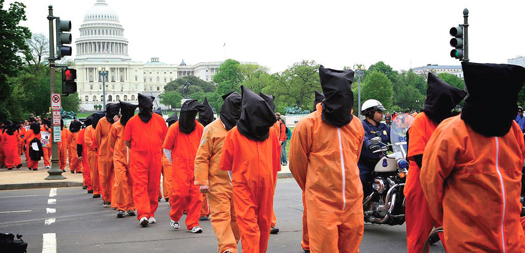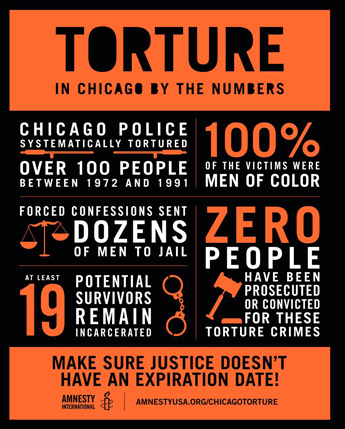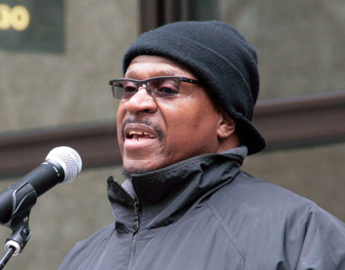Is torture the American way?
By Ashahed M. Muhammad -Assistant Editor- | Last updated: Apr 17, 2014 - 10:13:34 AMPrinter Friendly Page
Whether a ‘war on crime’ a ‘war on drugs’ or a ‘war on terror’ the country’s legacy of dehumanizing torture is being revealed
Related Report: Bringing human rights home to U.S. (FCN, 04-10-2014)

Protesters dressed as Guantanamo detainees march through the streets of Washington, D.C. Photo: Amnesty International
|
(FinalCall.com) - Torture, extrajudicial killings, unlawful detention, harassment, beatings, sexual assault, and humiliation are universally recognized as human rights abuses.
Typically, China, Iran, North Korea and Cuba are countries named when America’s political leaders discuss nations they believe are guilty of human rights violations.
As the country descends into a more heavily monitored surveillance state, many activists and victims of abuse are raising their voices calling America and her political leaders out by exposing their hypocrisy and failure to end misdeeds taking place on American soil. In fact, many activists believe America is among the worst offenders.
“The United States of America has a reputation for talking about atrocities in other countries, but what about here in our own back yard? asked Darrell Cannon, a torture survivor, speaking to reporters April 4 prior to a rally and march through downtown Chicago. “Atrocities have been committed right here in Chicago, Illinois by the Chicago police department,” he added.
 |
He served 24 years, nine of them in Tamms Supermax prison with no external contact. During that time, his mother, grandmother and several other family members died. After decades in jail, evidence of torture involving his case came to light. He was brought back to court and all previous charges were dropped resulting in his release on April 30, 2007.
“We need to take responsibility for what has happened in the past and what is happening now,” Mr. Cannon said. “It is hard to talk about having been tortured in the manner we have, but yet and still, it is a necessity,” he added.
A recent report by the United Nations Human Rights Committee was highly critical of the U.S. in the areas of widespread surveillance, international drone use, and torture.
The U.S. Senate Select Committee on Intelligence (SSCI) voted to declassify files related to the secret detention program operated by the Central Intelligence Agency (CIA) shortly following September 11, 2001.
The Central Intelligence Agency concealed details related to the intensity and severity of its enhanced interrogation methods, overstated terrorism plots and also attributed intelligence gathered from detainees to the efficacy of harsh techniques when in fact, they had already received actionable intelligence prior to enacting those techniques.
Chicago: Abu Ghraib of the Midwest?
Because of its sordid history of abuse, Chicago is called by many the Abu Ghraib of the Midwest.
Former Chicago Police Department Commander Jon Burge, was convicted in June 2011 of two counts of obstruction of justice and one count of perjury stemming from comments made during a 2003 civil case. Mr. Burge said he was unaware of any coercive interrogation techniques, physical abuse, or torture of any suspects in the Chicago Police Department’s Area 2 headquarters.

Chicago police torture survivor Anthony Holmes speaks at a April 4 rally Photo: Amnesty International
|
Mr. Burge was fired in 1993, however, he continued to collect his $36,000 a year pension. The city of Chicago has paid out over $20 million in settlements related to this reign of terror and according to G. Flint Taylor of the Chicago-based People’s Law Office, city, county, state and federal taxpayers have already paid more than $100 million during decades of investigating Mr. Burge and his henchmen.
Illinois Congressman Danny Davis seeks to pass the “Law Enforcement Torture Prevention Act” which would criminalize acts of torture committed by police and would eliminate the statute of limitations which allowed Mr. Burge and many others to evade justice in many torture cases.
The fight for justice also includes a reparations ordinance calling for financial compensation, public memorials about the cases, a formal apology, psychological counseling and vocational training for the victims. The ordinance also calls for history lessons regarding this painful period of Chicago’s history to be integrated into the curriculum of the Chicago Public School system.
“Burge abused his power and betrayed the public trust by abusing suspects in his custody, and then by lying under oath to cover up what he and other officers had done,” said Thomas E. Perez, Assistant Attorney General for the Civil Rights Division back in 2011.
Although former U.S. Attorney for the Northern District of Illinois Patrick J. Fitzgerald, said Cmdr. Burge’s being sentenced to 54 months in prison delivered “a measure of justice,” many victims of torture and their lawyers say more needs to be done.
Attorney Joey Mogul of the People’s Law Office counts many Chicago torture victims as her clients. She says the story is still being written and men still languish behind bars and uncompensated after being viciously tortured.
“We have overwhelming evidence that absolutely establishes beyond any reasonably doubt that is further confirmed by Burge’s conviction that this pattern and practice of racist torture occurred,” said Atty. Mogul. “We are now at the point where we have to ask today, what are we going to do to do right by the torture survivors?”
Atty. Mogul said she is aware of 19 torture victims still behind bars, but realistically, the true number of torture victims may never be known.
Mr. Cannon said he will never forgive those who brutalized him, but he does see justice on the horizon.
“It was a heartbreaking situation that came about, yet justice is beginning to prevail in all of these matters,” said Mr. Cannon. “It is all of our duties to see to it that justice does prevail,” he added.
Anthony Holmes was arrested and tortured in May 1973 directly by Mr. Burge. Mr. Holmes had his hands and ankles handcuffed to an electric shock box and a plastic bag placed over his head. He was repeatedly shocked, suffocated and passed out. Ultimately, he also confessed to a crime he did not commit. He believes the legal system let him and other torture victims down. Yes, many were members of street organizations and had troubled pasts, however, they did not deserve to be brutalized, he noted.
“After so long I finally got a little justice when I testified against Burge and the way he tortured me,” said Mr. Holmes. “We couldn’t do anything to prevent it. They had a chance to help us but they didn’t because we were from where we were from. I’m not saying all of us were good guys or bad guys, all I’m saying is that we deserve justice just like anybody else,” he added.
What happened to Mr. Cannon and Mr. Holmes occurred decades ago, however, recent protests in Albuquerque, New Mexico show police brutality problems still exist, not to mention the strident demonstrations targeting the New York Police Department’s “Stop and Frisk” policy. Activists say “Stop and Frisk” leads to torture and mass surveillance because it dehumanizes and degrades others, making it easier to deny them human rights.
In the latest example of law enforcement impropriety, an investigation showed officers within the Los Angeles Police Department tampered with in car audio recording equipment in an effort to evade monitoring. One inspection by investigators found half of the 80 patrol cars in one division were missing antennas. The LAPD has a long history of ethical violations.
In remarks April 10, Acting Assistant Attorney General Jocelyn Samuels announced the U.S. Department of Justice found that members of the Albuquerque Police Department in a majority of officer involved shootings resulting in fatalities between the 2009 and 2012 used excessive force in an unconstitutional manner. Additionally, officers also used their non-lethal options—such as Tasers which discharge 50,000 volts of electric charge—improperly “against people who were passively resisting and non-threatening or who were unable to comply with orders due to their mental state.”
“We found that officers used deadly force against people who did not pose an immediate threat of death or serious harm to officers or others, and against people who posed a threat only to themselves. In fact, sometimes it was the conduct of the officers themselves that heightened the danger and escalated the need to use force,” said Atty. Jocelyn Samuels. “Indeed, we found that encounters between police officers and persons with mental illness or in crisis too frequently resulted in a use of force or a higher level of force than necessary.”
Many reasons have been given for the excessive use of force problems within police department’s across the country. With the increased militarization and urban warfare tactical units being established in cities across America, it is possible many war veterans are trigger happy and may have learned torture methods during their tours of duty abroad. Rogue elements within these police departments may be using what they’ve learned abroad in urban patrol areas, activists said.
A war paradigm
Zeke Johnson, director of Amnesty International USA’s Security and Human Rights program said the problem in the U.S. is the existence of a “war paradigm” leading to overreach by political and military officials.
“The first root cause I think to all this is that the U.S. continues to believe that it is at war with a motley association of armed groups and because it is at war, the government thinks it can deny the application of international human rights law to its counterterrorism efforts,” said Mr. Johnson.
If White Christians had carried out 9/11, there would not have been a torture program nor an indefinite detention program, Mr. Johnson noted.
Lieutenant Colonel Sterling Thomas is defense counsel for Pakistani Ammar al Baluchi, one of the 9/11 defendants being held in Guantanamo Bay. He was captured in 2003, and has been held in Guantanamo since 2006. Lt. Col. Thomas said his client who is considered a “high value” was held at a “black site” unable to communicate with family members. A “black site” is a location where an unacknowledged or secret operation or program is conducted, however, recently, the term has gained notoriety describing the Central Intelligence Agency’s secret prisons generally operating outside of U.S. territories or legal jurisdiction.
“As a prosecutor, I’m appalled at many of the things I’ve seen my government do,” said Lt. Col. Thomas who has been assigned to Mr. al-Baluchi’s case since 2012.
He recalled a time when a member of an intelligence agency turned off the audio feed during a hearing simply because they didn’t like what one of the defense attorneys was saying. That is not transparency nor does it demonstrate a commitment to fairness and justice, he said.
“It’s that kind of thing that if we don’t awaken more people to the way this commission is being played out, it will continue,” he said. “You have to wonder, is there really someone on the other side who cares about this being a transparency affair, or is it just lip service?” he asked.
Investigative reporter Jeremy Scahill, author of “Dirty Wars: The World Is A Battlefield” and “Blackwater: The Rise of the World’s Most Powerful Mercenary Army” is an expert on the subject of the American government’s covert operations across the globe and domestic intrusion.
Much of this includes targeting whistleblowers and journalists in order to prevent the next Edward Snowden, said Mr. Scahill.
It is the responsibility of the public and independent media to keep the government and military in check, Scahill said. While journalists are being detained and killed in Yemen, Mexico and Syria, another type of war is aimed at journalists in the U.S. consisting of threats and systematic harassment of journalists and their sources.
“In this country, the war on journalism and journalists comes in a different form. It is not that they are bumping off journalists, it is that they are spying on journalists,” said Mr. Scahill during a recent talk at the Chicago Cultural Center.
“They are tracking metadata of reporters who are going aggressively at the CIA or National Security Agency or aspects of the military or corporations that service the military and the CIA,” said Mr. Scahill. “They are trying to determine, who are we talking to that they don’t want us talking to.”
Lt. Col. Thomas also said there are obstructionist efforts taking place in possible efforts to prevent certain damaging information from being brought to light.
“There is a government policy that is being enacted in how they are dealing with these intelligence community issues—deny, degrade and delay,” he said.
The Guantanamo Bay saga has been going on now for 13 years, and they are still in pre-trial hearings. Not only do those in captivity suffer, but so do the families of those who perished on 9/11, Lt. Col. Thomas said.
“We’re at thirteen years for a reason—because they can’t pull their case together. Because they can’t get their act together. Because they’ve chosen a system that was meant to hide their behavior—torture,” said Lt. Col. Thomas.
According to the “Guantanamo Docket” published and updated regularly by the New York Times, there are 154 currently detained in Guantanamo, however nearly 60 are actually cleared to either be released, or sent back to their countries of origin, but are still being detained for unspecified reasons.
To many, that is why Guantanamo Bay remains the most egregious and pressing human rights offense in the U.S.
Dr. Faten Hassan, lives in New York and is the director of the American Islamic Committee for Woman and Child. She said her group and others are obligated to protest torture and other human rights abuses no matter where they occur. Unfortunately, abuse of authority by law enforcement officials in Chicago, Albuquerque and New York is no different than what is going on in Egypt, Palestine, Syria, Burma and Central Africa.
“We are witnessing the daily saddening events of killing, detention, torture and the violation of all human rights of civilians everywhere,” said Dr. Hassan. “We have to stay, we have to fight, we have to speak up,” she added.





